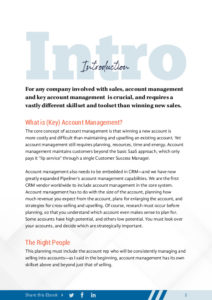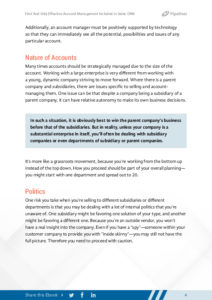For any company involved with sales, account management and key account management is crucial and requires a vastly different skillset and toolset than winning new sales.
What is (Key) Account Management?
The core concept of account management is that winning a new account is more costly and difficult than maintaining and upselling an existing account. Yet account management still requires planning, resources, time and energy. Account management maintains customers beyond the basic SaaS approach, which only pays it “lip service” through a single Customer Success Manager. Account management also needs to be embedded in CRM—and we have now greatly expanded Pipeliner’s account management capabilities. We are the first CRM vendor worldwide to include account management in the core system.
Account management has to do with the size of the account, planning how much revenue you expect from the account, plans for enlarging the account, and strategies for cross-selling and upselling. Of course, research must occur before planning, so that you understand which account even makes sense to plan for. Some accounts have high potential, and others low potential. You must look over your accounts, and decide which are strategically important.
The Right People
This planning must include the account rep who will be consistently managing and selling into accounts—as I said in the beginning, account management has its own skillset above and beyond just that of selling. Additionally, an account manager must be positively supported by technology so that they can immediately see all the potential, possibilities and issues of any particular account.
Nature of Accounts
Many times accounts should be strategically managed due to the size of the account. Working with a large enterprise is very different from working with a young, dynamic company striving to move forward. Where there is a parent company and subsidiaries, there are issues specific to selling and account-managing them. One issue can be that despite a company being a subsidiary of a parent company, it can have relative autonomy to make its own business decisions.
In such a situation, it is obviously best to win the parent company’s business before that of the subsidiaries. But in reality, unless your company is a substantial enterprise in itself, you’ll often be dealing with subsidiary companies or even departments of subsidiary or parent companies. It’s more like a grassroots movement, because you’re working from the bottom up instead of the top down. How you proceed should be part of your overall planning—you might start with one department and spread out to 20.
Politics
One risk you take when you’re selling to different subsidiaries or different departments is that you may be dealing with a lot of internal politics that you’re unaware of. One subsidiary might be favoring one solution of your type, and another might be favoring a different one. Because you’re an outside vendor, you won’t have a real insight into the company. Even if you have a “spy”—someone within your customer company to provide you with “inside skinny”—you may still not have the full picture. Therefore you need to proceed with caution.
Importance
Why is account management so crucial? Because managing accounts done well provides your company with a steady flow of revenue. Efficient account management builds strong relationships, and by doing so provides predictability. You’re able to say with some degree of confidence that a particular account will bring you a certain amount of revenue in the coming year.
I find it amusing that we all know that winning a new customer is much more difficult than selling to an existing customer—yet we’re the first CRM system that has ever embedded a real approach to account management.
In this ebook we’ll go into considerable detail about account management. Let’s get started!


































Comments (3)
lovely article… i learnt from this
i really like this written article
the information is clear and educative